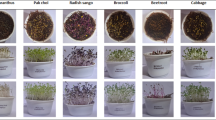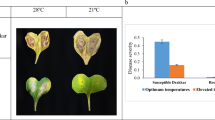Abstract
Canola is important for its oil, anticarcinogenic phytochemicals and low saturated fat content and has wide scope for further improvement through genetic transformations. Micropropagation is the practice of rapidly multiplying stock plant material to produce a large number of disease free progeny plants, using modern asceptic plant tissue culture methods and also to conserve germ plasm. A combination of auxin and cytikinin and a shock on growth regulator free medium is used for micropropagation. Molecular and physiochemical analysis done to know variation in seeds protein content and electric conductivity.
Similar content being viewed by others
Article PDF
Author information
Authors and Affiliations
Corresponding author
Rights and permissions
About this article
Cite this article
Khan, I., Shuaib, M., Khan, S. et al. A Micropropagation, Molecular and Physiochemical Analysis of Canola Brassica napus L. From Seeds. Nat Prec (2010). https://doi.org/10.1038/npre.2010.4781.2
Received:
Accepted:
Published:
DOI: https://doi.org/10.1038/npre.2010.4781.2



